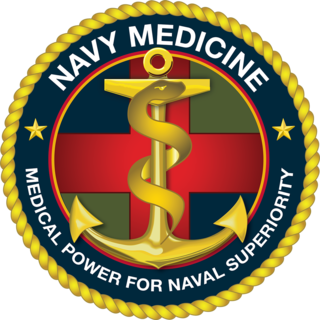WRHCS Commanders
- BG Patricia D. Horoho, 2007 to 2008
- BG Norvell Coots [1] [2]
The Walter Reed Health Care System (WRHCS) is a defunct unit of the United States Army . It was the army's comprehensive and integrated health care delivery system for the National Capital Region. It provides the full range of health care to members of the military and their families as well as members of the federal government. The WRHCS encompasses the Walter Reed Army Medical Center and seven other Army hospitals and health care clinics in Maryland, Pennsylvania, and Virginia.
| Facility | Location |
|---|---|
| Walter Reed Army Medical Center | Washington, D.C. |
| Barquist Army Health Care Facility | Fort Detrick, Maryland |
| Kimbrough Ambulatory Care Center | Fort George G. Meade, Maryland |
| Kirk Army Health Clinic | Aberdeen Proving Ground, Maryland |
| Dunham US Army Health Clinic | Carlisle Barracks, Pennsylvania |
| Fort Belvoir Community Hospital | Fort Belvoir, Virginia |
| DiLorenzo Clinic | The Pentagon |
| Rader Army Health Clinic | Fort Myer, Virginia |

Walter Reed was a U.S. Army physician who in 1901 led the team that confirmed the theory of Cuban doctor Carlos Finlay that yellow fever is transmitted by a particular mosquito species rather than by direct contact. This insight gave impetus to the new fields of epidemiology and biomedicine, and most immediately allowed the resumption and completion of work on the Panama Canal (1904–1914) by the United States. Reed followed work started by Finlay and directed by George Miller Sternberg, who has been called the "first U.S. bacteriologist".

The U.S. Army Medical Command (MEDCOM) is a direct reporting unit of the U.S. Army that formerly provided command and control of the Army's fixed-facility medical, dental, and veterinary treatment facilities, providing preventive care, medical research and development and training institutions. On 1 October 2019, operational and administrative control of all military medical facilities transitioned to the Defense Health Agency.

The Walter Reed Army Medical Center (WRAMC), officially known as Walter Reed General Hospital (WRGH) until 1951, was the U.S. Army's flagship medical center from 1909 to 2011. Located on 113 acres (46 ha) in Washington, D.C., it served more than 150,000 active and retired personnel from all branches of the United States Armed Forces. The center was named after Walter Reed, a U.S. Army physician and sergeant who led the team that confirmed that yellow fever is transmitted by mosquitoes rather than direct physical contact.

Tricare is a health care program of the United States Department of Defense Military Health System. Tricare provides civilian health benefits for U.S Armed Forces military personnel, military retirees, and their dependents, including some members of the Reserve Component. Tricare is the civilian care component of the Military Health System, although historically it also included health care delivered in military medical treatment facilities. Tricare functions similar to a single-payer healthcare system.

Psychiatric and mental health nurses in the U.S. Army Nurse Corps employing groundbreaking protocols and treatments in psychiatric issues to address the unique challenges that our service men and women face, more commonly post-traumatic stress disorder and traumatic brain injuries. Most people understand that trauma exposure is a popular occupational hazard for military members. Psychiatric screenings, before and during their enlistment, and treatments after being exposed to warfare, death, destruction, and torture have been extremely beneficial for military personnel and their dependents.

Major James Carroll was a US Army physician.
Major Walter Reed (1851–1902) was a U.S. Army physician celebrated for work establishing that yellow fever is spread by mosquitoes.

Walter Reed National Military Medical Center (WRNMMC), formerly known as the National Naval Medical Center and colloquially referred to as Bethesda Naval Hospital, Walter Reed, or Navy Med, is a United States military medical center located in Bethesda, Maryland. It is one of the largest and most prominent military medical centers in the nation and has provided medical care for several U.S. presidents since its opening in 1940.

The Carl R. Darnall Army Medical Center is a United States Department of Defense medical facility at Fort Cavazos, Texas. It provides medical care to servicemembers and their families, along with veterans and their dependents, in and around the largest U.S. military installation in the world. Named after inventor of water chlorination Brigadier General Carl Rogers Darnall, MD., the core of the medical center is a state of the art 947,000-square-foot hospital. The facility opened in 2016, and includes a full primary care and emergency medical facility, including a level III trauma center, and specialized care in obstetrics and gynaecology, orthopedics, and behavioral health. The hospital provides treatment to nearly 3,000 patients daily. The medical center is one of the largest in the Military Health System, comprising more than 105 buildings in addition to the main facility, spread over Fort Cavazos, three local communities, and a clinic at the Red River Army Depot in Bowie County, Texas, outside of Texarkana. The medical center and its outlying facilities are staffed nearly entirely by uniformed servicemembers of the U.S. Army, however in 2019, the administrative control of the facility was shifted from United States Army Medical Command to the Defense Health Agency, an integrated joint Department of Defense combat support agency. All patients of the facility are insured and billed through Tricare, the health insurance system of the DoD. The medical center is led by Colonel Richard G. Malish.
The Walter Reed Army Medical Center neglect scandal refers to a series of allegations of unsatisfactory conditions, treatment of patients, and management at the Walter Reed Army Medical Center (WRAMC) in Washington, D.C. culminating in two articles published by The Washington Post in February 2007. Several cases of patient neglect and shoddy living conditions were reported as early as 2004. "Soldiers suffering from traumatic brain injuries or stress disorders, others with amputated limbs, have languished for weeks and months on end in vermin-infested quarters waiting for a decision on their military status and a ruling on the level of benefits they will receive if they are discharged and transferred to the civilian-run Veterans Administration (VA) healthcare system." When the scandal broke, soldiers were pressured to keep quiet and punished with daily inspections for speaking to the press. Significant public and media attention was generated, which in turn prompted a number of congressional and executive actions, including resignations of several high-ranking officers.

The Madigan Army Medical Center, located on Joint Base Lewis-McChord just outside Lakewood, Washington, is a key component of the Madigan Healthcare System and one of the largest military hospitals on the West Coast of the United States.

Fort Belvoir Community Hospital is a Department of Defense medical facility located on Fort Belvoir, Virginia, outside of Washington D.C. In conjunction with Walter Reed National Military Medical Center, Belvoir provides the Military Health System medical capabilities of the National Capital Region Medical Directorate, a joint unit providing comprehensive care to members of the United States Armed Forces located in the capital area, and their families. The facility is located on a U.S. Army installation, but operates as one of the first joint service medical facilities in the U.S. military, staffed with uniformed medical personnel from the Army, Navy, and Air Force. The hospital is one of the largest medical facilities in Northern Virginia, and provides all levels of inpatient and outpatient medical care. The facility maintains a 24 hour emergency department but, like most U.S. military hospitals, transfers patients in need of a trauma center to equipped civilian medical facilities. As part of federal emergency planning in the National Capitol Region, the hospital is also tasked with maintaining unique capabilities to support continuity of government operations in the event of crisis.

The term military medicine has a number of potential connotations. It may mean:

The Bureau of Medicine and Surgery (BUMED) is an agency of the United States Department of the Navy that manages health care activities for the United States Navy and the United States Marine Corps. BUMED operates hospitals and other health care facilities as well as laboratories for biomedical research, and trains and manages the Navy's many staff corps related to medicine. Its headquarters is located at the Defense Health Headquarters in Fairfax County, Virginia. BUMED has 63,000 medical personnel and more than a million eligible beneficiaries.

The Joint Task Force National Capital Region Medical, also known as National Capital Region Medical, is located on the Naval Support Activity Bethesda campus in Bethesda, Maryland and was established by Deputy Secretary of Defense Gordon R. England.
Washington, D.C. is a national center for patient care and medical research. There is currently a total of 16 medical centers and hospitals located within the District of Columbia. There are also numerous medical research centers in the Washington area, most notably the National Institutes of Health in Bethesda, Maryland.

Brigadier General Robin Umberg, Deputy Commander Clinical Services 3rd Medical Command, is one of several female United States Army general officers.
Todd E. Rasmussen, MD, FACS is a Professor and Vice Chair for Education in the Department of Surgery at Mayo Clinic, Rochester and a Senior Associate Consultant in the Division of Vascular and Endovascular Surgery. Prior to joining the Mayo Clinic, he had a 28-year career in the military, retiring as an Air Force Colonel in 2021. His most recent military assignment was as Associate Dean or Research at the Uniformed Services University of the Health Sciences and an attending surgeon at the Walter Reed National Military Medical Center. A native of Kansas, Rasmussen completed his undergraduate degree at the University of Kansas and his medical degree at Mayo Medical School (1993), followed by surgical training at Wilford Hall Medical Center at Lackland Air Force Base and vascular surgery specialty training at Mayo Clinic.

The Academy of Family Physicians of India (AFPI) is a professional academic society, registered as a non-profit organization in India. AFPI has been founded with the aim of promoting family medicine and primary healthcare. Family medicine is the practicing speciality and academic discipline of majority Indian doctors. Although there were GP associations such as IMA CGP and FFPAI have been existing for several decades, there was no forum for spearheading development of academic family medicine in India. AFPI is an equivalent organization to American Academy of Family Physicians, College of Family Physicians of Canada, Royal College of General Practitioners, Royal Australian College of General Practice for India.

Norvell V. Coots is an American physician, hospital administrator and retired military officer. Since August 1, 2016, he has been president and CEO of Holy Cross Health, a Catholic, not-for-profit health system in Maryland that is part of Trinity Health. As a medical officer in the United States Army, he served as Commanding General and CEO of Regional Health Command Europe, and Command Surgeon, U.S. Army Europe and Seventh Army, and earlier as the final head of the Walter Reed Army Medical Center and Walter Reed Health Care System in Washington, D.C. He retired as a brigadier general.